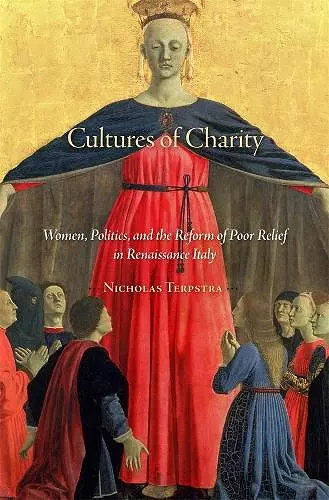Cultures of Charity
Women, Politics, and the Reform of Poor Relief in Renaissance Italy
Format:Hardback
Publisher:Harvard University Press
Published:13th Mar '13
Currently unavailable, and unfortunately no date known when it will be back

This sweeping exploration of early modern poor relief shows how Bologna became a model for other cities in meeting the challenge of female poverty across the life cycle. By putting gender squarely at the center of analysis, Terpstra brilliantly illuminates how widespread concerns for poor women and girls sparked innovative networks of care aimed at both charity and discipline. -- Sharon Strocchia, Emory University Terpstra's intimate and human study of Bologna's attempts to deal with the life cycle of poverty-especially that of women-provides a virtual comparative history of the troubled relationship between rich and poor in early modern Europe. This is the new social and cultural history at its best-rich with significant findings, livened with everyday human details, and sensitively evoked by a master historian. -- Guido Ruggiero, University of Miami
Renaissance debates about politics and gender led to pioneering forms of poor relief, devised to help women get a start in life. These included orphanages for illegitimate children and forced labor in workhouses, but also women’s shelters and early forms of maternity benefits, unemployment insurance, food stamps, and credit union savings plans.
Renaissance Italians pioneered radical changes in ways of helping the poor, including orphanages, workhouses, pawnshops, and women’s shelters. Nicholas Terpstra shows that gender was the key factor driving innovation. Most of the recipients of charity were women. The most creative new plans focused on features of women’s poverty like illegitimate births, hunger, unemployment, and domestic violence. Signal features of the reforms, from forced labor to new instruments of saving and lending, were devised specifically to help young women get a start in life.
Cultures of Charity is the first book to see women’s poverty as the key factor driving changes to poor relief. These changes generated intense political debates as proponents of republican democracy challenged more elitist and authoritarian forms of government emerging at the time. Should taxes fund poor relief? Could forced labor help build local industry? Focusing on Bologna, Terpstra looks at how these fights around politics and gender generated pioneering forms of poor relief, including early examples of maternity benefits, unemployment insurance, food stamps, and credit union savings plans.
This sweeping exploration of early modern poor relief shows how Bologna became a model for other cities in meeting the challenge of female poverty across the life cycle. By putting gender squarely at the center of analysis, Terpstra brilliantly illuminates how widespread concerns for poor women and girls sparked innovative networks of care aimed at both charity and discipline. -- Sharon Strocchia, Emory University
Terpstra's intimate and human study of Bologna's attempts to deal with the life cycle of poverty—especially that of women—provides a virtual comparative history of the troubled relationship between rich and poor in early modern Europe. This is the new social and cultural history at its best—rich with significant findings, livened with everyday human details, and sensitively evoked by a master historian. -- Guido Ruggiero, University of Miami
- Winner of Phyllis Goodhart Gordan Book Prize 2014
- Winner of Helen and Howard R. Marraro Prize 2014
- Nominated for Wallace K. Ferguson Prize 2014
- Nominated for Roland H. Bainton Book Prize 2014 (United States)
ISBN: 9780674067097
Dimensions: unknown
Weight: unknown
400 pages